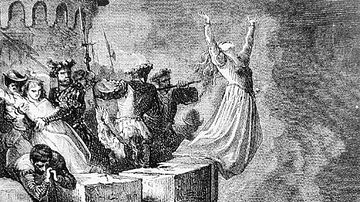Search
Did you mean: Soma?
Search Results

Article
Rome's Response to the Spread of Christianity
During the 1st century CE, a sect of Jews in Jerusalem claimed that their teacher, Jesus of Nazareth, was the 'messiah' of Israel. 'Messiah' meant 'anointed one', or someone chosen by the God of Israel to lead when God would intervene in...

Article
Italian Colonialism in Libya
One of the most coveted projects of Italian colonial policy was to secure an African colony in the Mediterranean. For this reason, Italy fought and won the Italo-Turkish war of 1911-1912 for the control of Tripolitania and Cyrenaica. These...

Article
Ten Ancient Rome Facts You Need to Know
Ancient Roman culture affected vast numbers of people across the known world of its time, beginning with the rise of the Roman Republic (509-27 BCE) and throughout the duration of the Roman Empire (27 BCE - c. 476 CE in the West and 1453...

Interview
Interview: Nudity in the Ancient World
The nude figure is a universal visual theme, deeply rooted in the history of art, and it is seemingly ubiquitous in the art of the ancient civilizations of the Near East and Mediterranean. The Antikenmuseum, in Basel, Switzerland, recently...

Article
An Ancient City Beneath Rome: Visiting The Catacombs of Priscilla
Any visitor to Rome will want to see and explore the popular historical and cultural sites - the Colosseum, the Forum, the Trevi Fountain and, of course, the Vatican. But a large part of the city's ancient history actually lies underground...

Article
Ara Pacis Augustae
The Ara Pacis Augustae or Altar of the Augustan Peace in Rome was built to celebrate the return of Augustus in 13 BCE from his campaigns in Spain and Gaul. The marble structure, which once stood on the Campus Martius, is a masterpiece of...

Article
The Sixteenth-Century Massacre of the Waldensians of Mérindol
As the Reformation developed in France in the first half of the 16th century, there were several episodes of severe repression which preceded the Wars of Religion (1562-1598). These were times of great hardship and oppression against those...

Article
Conflict & Celts: The Creation of Ancient Galatia
Galatia was the most long-lasting and powerful Celtic settlement outside of Europe. It was the only kingdom of note to be forged during the Celtic invasions of the Mediterranean in the 4th and 3rd centuries BCE. From its foundation, Galatia...

Article
Death's Mansions: The Columbaria of Imperial Rome
A columbarium is an underground chamber, which the Romans used for preserving the ashes of the dead. During the 1st and 2nd centuries CE, hundreds of columbaria lined the consular highways leading out of Rome, although now only some two dozen...

Article
Exploring Classical Pula, Croatia
Located at the southern tip of the Istrian peninsula, Croatia’s westernmost outcrop, Pula is a town of extraordinary beauty with a 3000-year history. This important Istrian port boasts a rich and varied cultural heritage and has some of the...